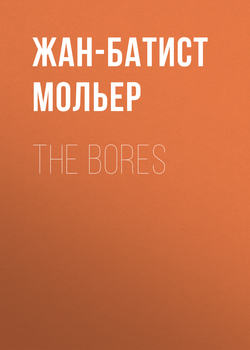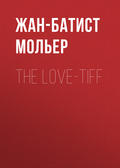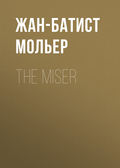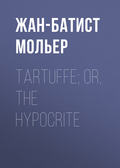
000
ОтложитьЧитал
SCENE V. – ORPHISE, ÉRASTE
ER. (Seeing Orphise, and going to meet her). How long you have been, Madam, and how I suffer …
ORPH. Nay, nay, do not leave such a pleasant conversation. You are wrong to blame me for having arrived too late. (Pointing to Orante and Climène, who have just left). You had wherewithal to get on without me.
ER. Will you be angry with me without reason, and reproach me with what I am made to suffer? Oh, I beseech you, stay …
ORPH. Leave me, I beg, and hasten to rejoin your company.
SCENE VI. – ÉRASTE, alone
Heaven! must bores of both sexes conspire this day to frustrate my dearest wishes? But let me follow her in spite of her resistance, and make my innocence clear in her eyes.
SCENE VII. – DORANTE, ÉRASTE
DOR. Ah, Marquis, continually we find tedious people interrupting the course of our pleasures! You see me enraged on account of a splendid hunt, which a booby … It is a story I must relate to you.
ER. I am looking for some one, and cannot stay.
DOR. (Retaining him). Egad, I shall tell it you as we go along. We were a well selected company who met yesterday to hunt a stag; on purpose we went to sleep on the ground itself – that is, my dear sir, far away in the forest. As the chase is my greatest pleasure, I wished, to do the thing well, to go to the wood myself; we decided to concentrate our efforts upon a stag which every one said was seven years old.
[Footnote: The original expression is cerf dix-corps; this, according to the dictionnaire de chasse, is a seven years' old animal.]
But my own opinion was – though I did not stop to observe the marks – that it was only a stag of the second year.
[Footnote: The technical term is: "a knobbler;" in French, _un cerf à sa seconde tête.]
We had separated, as was necessary, into different parties, and were hastily breakfasting on some new-laid eggs, when a regular country-gentleman, with a long sword, proudly mounted on his brood-mare, which he honoured with the name of his good mare, came up to pay us an awkward compliment, presenting to us at the same time, to increase our vexation, a great booby of a son, as stupid as his father. He styled himself a great sportsman, and begged that he might have the pleasure of accompanying us. Heaven preserve every sensible sportsman, when hunting, from a fellow who carries a dog's horn, which sounds when it ought not; from those gentry who, followed by ten mangy dogs, call them "my pack," and play the part of wonderful hunters. His request granted, and his knowledge commended, we all of us started the deer,
[Footnote: The original has frapper à nos brisées; brisées means "blinks." According to Dr. Ash's Dictionary, 1775, "Blinks are the boughs or branches thrown in the way of a deer to stop its course."]
within thrice the length of the leash, tally-ho! the dogs were put on the track of the stag. I encouraged them, and blew a loud blast. My stag emerged from the wood, and crossed a pretty wide plain, the dogs after him, but in such good order that you could have covered them all with one cloak. He made for the forest. Then we slipped the old pick upon him; I quickly brought out my sorrel-horse. You have seen him?
ER. I think not.
DOR. Not seen him? The animal is as good as he is beautiful; I bought him some days ago from Gaveau.
[Footnote: A well-known horse-dealer in Molière's time.]
I leave you to think whether that dealer, who has such a respect for me, would deceive me in such a matter; I am satisfied with the horse. He never indeed sold a better, or a better-shaped one. The head of a barb, with a clear star; the neck of a swan, slender, and very straight; no more shoulder than a hare; short-jointed, and full of vivacity in his motion. Such feet – by Heaven! such feet! – double-haunched: to tell you the truth, it was I alone who found the way to break him in. Gaveau's Little John never mounted him without trembling, though he did his best to look unconcerned. A back that beats any horse's for breadth; and legs! O ye Heavens!
[Footnote: Compare the description of the horse given by the Dauphin in Shakespeare's Henry V., Act iii., Scene 6, and also that of the "round hoof'd, short jointed" jennet in the Venus and Adonis of the same author.]
In short, he is a marvel; believe me, I have refused a hundred pistoles for him, with one of the horses destined for the King to boot. I then mounted, and was in high spirits to see some of the hounds coursing over the plain to get the better of the deer. I pressed on, and found myself in a by-thicket at the heels of the dogs, with none else but Drecar.
[Footnote: A famous huntsman in Molière's time.]
There for an hour our stag was at bay. Upon this, I cheered on the dogs, and made a terrible row. In short, no hunter was ever more delighted! I alone started him again; and all was going on swimmingly, when a young stag joined ours. Some of my dogs left the others. Marquis, I saw them, as you may suppose, follow with hesitation, and Finaut was at a loss. But he suddenly turned, which delighted me very much, and drew the dogs the right way, whilst I sounded horn and hallooed, "Finaut! Finaut!" I again with pleasure discovered the track of the deer by a mole-hill, and blew away at my leisure. A few dogs ran back to me, when, as ill-luck would have it, the young stag came over to our country bumpkin. My blunderer began blowing like mad, and bellowed aloud, "Tallyho! tallyho! tallyho!" All my dogs left me, and made for my booby. I hastened there, and found the track again on the highroad. But, my dear fellow, I had scarcely cast my eyes on the ground, when I discovered it was the other animal, and was very much annoyed at it. It was in vain to point out to the country fellow the difference between the print of my stag's hoof and his. He still maintained, like an ignorant sportsman, that this was the pack's stag; and by this disagreement he gave the dogs time to get a great way off. I was in a rage, and, heartily cursing the fellow, I spurred my horse up hill and down dale, and brushed through boughs as thick as my arm. I brought back my dogs to my first scent, who set off, to my great joy, in search of our stag, as though he were in full view. They started him again; but, did ever such an accident happen? To tell you the truth, Marquis, it floored me. Our stag, newly started, passed our bumpkin, who, thinking to show what an admirable sportsman he was, shot him just in the forehead with a horse-pistol that he had brought with him, and cried out to me from a distance, "Ah! I've brought the beast down!" Good Heavens! did any one ever hear of pistols in stag-hunting? As for me, when I came to the spot, I found the whole affair so odd, that I put spurs to my horse in a rage, and returned home at a gallop, without saying a single word to that ignorant fool.
ER. You could not have done better; your prudence was admirable. That is how we must get rid of bores. Farewell.
DOR. When you like, we will go somewhere where we need not dread country-hunters.
ER. (Alone). Very well. I think I shall lose patience in the end.
Let me make all haste, and try to excuse myself.
BALLET TO ACT II
First Entry.
Bowlers stop Éraste to measure a distance about which there is a dispute. He gets clear of them with difficulty, and leaves them to dance a measure, composed of all the postures usual to that game.
Second Entry.
Little boys with slings enter and interrupt them, who are in their turn driven out by
Third Entry.
Cobblers, men and women, their fathers, and others, who are also driven out in their turn.
Fourth Entry.
A gardener, who dances alone, and then retires.
* * * * *
ACT III
SCENE I. – ÉRASTE, LA MONTAGNE
ER. It is true that on the one hand my efforts have succeeded; the object of my love is at length appeased. But on the other hand I am wearied, and the cruel stars have persecuted my passion with double fury. Yes, Damis, her guardian, the worst of bores, is again hostile to my tenderest desires, has forbidden me to see his lovely niece, and wishes to provide her to-morrow with another husband. Yet Orphise, in spite of his refusal, deigns to grant me this evening a favour; I have prevailed upon the fair one to suffer me to see her in her own house, in private. Love prefers above all secret favours; it finds a pleasure in the obstacle which it masters; the slightest conversation with the beloved beauty becomes, when it is forbidden, a supreme favour. I am going to the rendezvous; it is almost the hour; since I wish to be there rather before than after my time.
LA M. Shall I follow you?
ER. No. I fear least you should make me known to certain suspicious persons.
LA M. But …
ER. I do not desire it.
LA M. I must obey you. But at least, if at a distance…
ER. For the twentieth time will you hold your tongue? And will you never give up this practice of perpetually making yourself a troublesome servant?
SCENE II. – CARITIDÈS; ÉRASTE
CAR. Sir, it is an unseasonable time to do myself the honour of waiting upon you; morning would be more fit for performing such a duty, but it is not very easy to meet you, for you are always asleep, or in town. At least your servants so assure me. I have chosen this opportunity to see you. And yet this is a great happiness with which fortune favours me, for a couple of moments later I should have missed you.
ER. Sir, do you desire something of me?
CAR. I acquit myself, sir, of what I owe you; and come to you … Excuse the boldness which inspires me, if…
ER. Without so much ceremony, what have you to say to me?
CAR. As the rank, wit, and generosity which every one extols in you…
ER. Yes, I am very much extolled. Never mind that, sir.
CAR. Sir, it is a vast difficulty when a man has to introduce himself; we should always be presented to the great by people who commend us in words, whose voice, being listened to, delivers with authority what may cause our slender merit to be known. In short, I could have wished that some persons well-informed could have told you, sir, what I am…
ER. I see sufficiently, sir, what you are. Your manner of accosting me makes that clear.
CAR. Yes, I am a man of learning charmed by your worth; not one of those learned men whose name ends simply in us. Nothing is so common as a name with a Latin termination. Those we dress in Greek have a much superior look; and in order to have one ending in ès, I call myself Mr. Caritidès.
ER. Caritidès be it. What have you to say?
CAR. I wish, sir, to read you a petition, which I venture to beg of you to present to the King, as your position enables you to do.
ER. Why, sir, you can present it yourself! …
CAR. It is true that the King grants that supreme favour; but, from the very excess of his rare kindness, so many villainous petitions, sir, are presented that they choke the good ones; the hope I entertain is that mine should be presented when his Majesty is alone.
ER. Well, you can do it, and choose your own time.
CAR. Ah, sir, the door-keepers are such terrible fellows! They treat men of learning like snobbs and butts; I can never get beyond the guard-room. The ill-treatment I am compelled to suffer would make me withdraw from court for ever, if I had not conceived the certain hope that you will be my Mecaeænas with the King. Yes, your influence is to me a certain means …
ER. Well, then, give it me; I will present it.
CAR. Here it is. But at least, hear it read.
ER. No …
CAR. That you may be acquainted with it, sir, I beg.
"TO THE KING
"Sire, – Your most humble, most obedient, most faithful and most learned subject and servant, Caritidès, a Frenchman by birth, a Greek
[Footnote: The original has Grec, a Greek. Can Caritidès have wished to allude to the græaca fides? Grec means also a cheat at cards, and is said to owe its name to a certain Apoulos, a knight of Greek origin, who was caught in the very act of cheating at play in the latter days of Louis XIV.'s reign, even in the palace of the grand monarque.]
_by profession, having considered the great and notable abuses which are perpetrated in the inscriptions on the signs of houses, shops, taverns, bowling-alleys, and other places in your good city of Paris; inasmuch as certain ignorant composers of the said inscriptions subvert, by a barbarous, pernicious and hateful spelling, every kind of sense and reason, without any regard for etymology, analogy, energy or allegory whatsoever, to the great scandal of the republic of letters, and of the French nation, which is degraded and dishonoured, by the said abuses and gross faults, in the eyes of strangers, and notably of the Germans, curious readers and inspectors of the said inscriptions…"
[Footnote: This is an allusion either to the reputation of the Germans as great drinkers, or as learned decipherers of all kinds of inscriptions.]
ER. This petition is very long, and may very likely weary…
CAR. Ah, sir, not a word could be cut out.
ER. Finish quickly.
CAR. (Continuing). "Humbly petitions your Majesty to constitute, for the good of his state and the glory of his realm, an office of controller, supervisor, corrector, reviser and restorer in general of the said inscriptions; and with this office to honour your suppliant, as well in consideration of his rare and eminent erudition, as of the great and signal services which he has rendered to the state and to your Majesty, by making the anagram of your said Majesty in French, Latin, Greek, Hebrew, Syriac, Chaldean, Arabic…"
ER. (Interrupting him). Very good. Give it me quickly and retire: it shall be seen by the King; the thing is as good as done.








